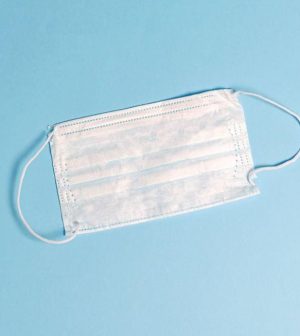- Recognizing the Signs of Hypothyroidism
- 10 Strategies to Overcome Insomnia
- Could Artificial Sweeteners Be Aging the Brain Faster?
- Techniques for Soothing Your Nervous System
- Does the Water in Your House Smell Funny? Here’s Why
- Can a Daily Dose of Apple Cider Vinegar Actually Aid Weight Loss?
- 6 Health Beverages That Can Actually Spike Your Blood Sugar
- Treatment Options for Social Anxiety Disorder
- Understanding the Connection Between Anxiety and Depression
- How Daily Prunes Can Influence Cholesterol and Inflammation
Masks Still Not Needed for Vaccinated Americans, CDC Director Says

The head of the U.S. Centers of Disease Control and Prevention on Wednesday stood by the agency’s latest mask guidance, saying that fully vaccinated Americans need not wear face coverings as the pandemic ebbs.
Even so, there are instances where local authorities might set more stringent measures to protect the unvaccinated against the highly contagious Delta variant, such as Los Angeles did this week, CDC Director Dr. Rochelle Walensky noted.
“We have always said that this virus is an opportunist, and in areas where we still have rates of low vaccination, that is where the virus is likely to take hold,” she said on “Good Morning America.” “We are still seeing upticks of cases in areas of low vaccination, and in that situation we are suggesting that policies be made at the local level.”
“Those masking policies are not to protect the vaccinated — they are to protect the unvaccinated,” Walensky added.
Dr. Vivek Murthy, the U.S. surgeon general, concurred on CNN Wednesday, saying he saw nothing wrong with local authorities imposing new restrictions if needed.
“If I was in a community that had a low vaccination rate, as a number of our communities do around the country, if I was seeing a rise in the Delta variant, I think it’s perfectly reasonable to think about different approaches we could take to limit spread to try to get ahead of it,” Murthy said.
Their comments came after the World Health Organization (WHO) reiterated long-standing guidance this week that everyone, vaccinated or not, wear masks following a global surge in infections triggered by the highly contagious Delta variant.
“The WHO really does have to make recommendations for an entire world,” and many countries have far less access to vaccines than the United States, Walensky explained.
The Delta variant now accounts for about 1 in 4 infections in the United States, according to new CDC estimates, The New York Times reported. Still, cases across the country have plummeted in recent months, along with hospitalizations and deaths.
But the average rate of U.S. vaccinations a day has also decreased by about 75 percent from the peak reported in mid-April, the Times reported. As of Tuesday, about 46 percent of people of all ages and about 57 percent of adults are fully vaccinated, according to federal data.
Most Americans who wanted a vaccine has already gotten one: poll
In another sign that coronavirus vaccination rates have plateaued in America, a new poll shows that most adults who wanted a COVID-19 vaccine have already gotten one.
Released Wednesday, the Kaiser Family Foundation (KFF) report shows 65% of adults polled have received at least one dose of the vaccine, up from 62% in May.
But only 3% of those who haven’t been vaccinated said they plan to do so as soon as they can. About 14% said they will definitely not get vaccinated.
On Tuesday, Dr. Anthony Fauci warned there could soon be “two Americas” — one where most people are vaccinated and another where low vaccination rates could trigger spikes in cases.
“When you have such a low level of vaccination superimposed upon a variant that has a high degree of efficiency of spread, what you are going to see among under-vaccinated regions, be that states, cities or counties, you’re going to see these individual types of blips,” he told CNN.
“This is entirely avoidable, entirely preventable. If you are vaccinated, you diminish dramatically your risk of getting infected and even more dramatically your risk of getting seriously ill,” Fauci said. “If you are not vaccinated, you are at considerable risk.”
Nearly 20% of the people who are not vaccinated said they believe the vaccine is too new. A smaller number of people surveyed cited other reasons, like concerns about side effects or distrust in the government.
More than 30% of adults who are not immunized said they would be more inclined to get a vaccine if it’s completely approved by the U.S. Food and Drug Administration. All COVID-19 vaccines in the United States are now only approved for emergency use.
The report did uncover one bright spot: When employers encourage vaccination, rates rise. About 73% of workers with employers encouraging COVID-19 vaccination said they have received at least one shot, compared to 41% with employers not encouraging vaccination.
“Getting more Americans vaccinated isn’t only up to the government,” KFF President and CEO Drew Altman said in a KFF news release. “Even without requiring workers to get a vaccine, employers can play a role by offering paid time off to get vaccinated and encouraging their workers to do so.”
The report also found that in most American households, either everyone is vaccinated against COVID-19 or no one is.
The poll shows 77% of vaccinated adults said everyone in their home is vaccinated, while 75% of unvaccinated adults said no one they live with is.
But overall, more people live in vaccinated homes: 50% of adults said they live in fully vaccinated households, while 25% said they’re in fully unvaccinated households, the poll showed.
More information
The U.S. Centers for Disease Control and Prevention has more on COVID-19 vaccinations.
SOURCE: The New York Times; CNN
Source: HealthDay
Copyright © 2026 HealthDay. All rights reserved.










